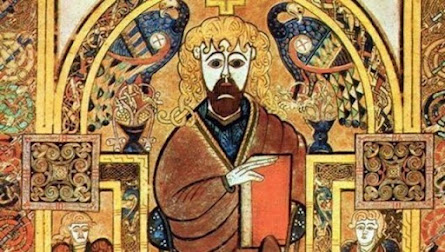In a reflection on the Gospel of John 10:31-42, Bishop Robert Baron promotes the idea of "coinherence":
Charles Williams stated that the master idea of Christianity is "coinherence," mutual indwelling. If you want to see this idea concretely displayed, look to the pages of the Book of Kells, that masterpiece of early Christian illumination. Lines interwoven, designs turning in and around on each other, plays of plants, animals, planets, human beings, angels, and saints. The Germans call it Ineinander (one in the other).
I am not beyond pointing out that a "religious" insight might provide a valuable "political" insight, as well. When talking about "coinherence," from a political perspective, the point is that while we are all "individuals," and that our individual existences fundamentally define who it is we are, we are not only individuals. We are, in fact, "together through life." It is our "coinherence" that ultimately best describes the nature of our political reality (our "human" reality), and we forget this at our peril.
None of us can survive as a solitary individual. You don't have to be a particular fan of John Donne (or Catholic Bishops, for that matter) to understand that Donne was right, and that "No man is an island, entire of itself."
When we forget the fact of our coinherence, and celebrate and promote our divisions and singularities, as a substitute for a recognition of our connection and unity, we put our ability to survive at risk.
oooOOOooo
For Whom the Bell Tolls
by John Donne
No man is an island,
Entire of itself.
Each is a piece of the continent,
A part of the main.
If a clod be washed away by the sea,
Europe is the less.
As well as if a promontory were.
As well as if a manor of thine own
Or of thine friend's were.
Each man's death diminishes me,
For I am involved in mankind.
Therefore, send not to know
For whom the bell tolls,
It tolls for thee.
Image Credit:
https://www.irishcentral.com/roots/history/secrets-book-of-kells


No comments:
Post a Comment
Thanks for your comment!